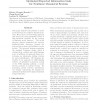Free Online Productivity Tools
i2Speak
i2Symbol
i2OCR
iTex2Img
iWeb2Print
iWeb2Shot
i2Type
iPdf2Split
iPdf2Merge
i2Bopomofo
i2Arabic
i2Style
i2Image
i2PDF
iLatex2Rtf
Sci2ools
128
Voted
ICML
2009
IEEE
2009
IEEE
Optimized expected information gain for nonlinear dynamical systems
This paper addresses the problem of active model selection for nonlinear dynamical systems. We propose a novel learning approach that selects the most informative subset of time-dependent variables for the purpose of Bayesian model inference. The model selection criterion maximizes the expected Kullback-Leibler divergence between the prior and the posterior probabilities over the models. The proposed strategy generalizes the standard D-optimal design, which is obtained from a uniform prior with Gaussian noise. In addition, our approach allows us to determine an information halting criterion for model identification. We illustrate the benefits of our approach by differentiating between 18 published biochemical models of the TOR signaling pathway, a model selection problem in systems biology. By generating pivotal selection experiments, our strategy outperforms the standard Aoptimal, D-optimal and E-optimal sequential design techniques.
Active Model Selection | ICML 2009 | Machine Learning | Model Selection Criterion | Model Selection Problem |
Related Content
| Added | 17 Nov 2009 |
| Updated | 17 Nov 2009 |
| Type | Conference |
| Year | 2009 |
| Where | ICML |
| Authors | Alberto Giovanni Busetto, Cheng Soon Ong, Joachim M. Buhmann |
Comments (0)

